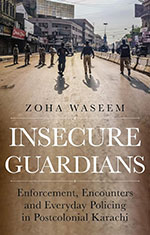Policing in postcolonial South Asian countries has been a complex mix of legacies from the colonial era, local traditions and the freedom struggle. Post Independence, they had to deal with the mammoth task of reforming and transforming their policing institutions. South Asian countries have been marred with instances of police brutality, excessive use of force and blatant abuse of human rights which is often justified in the name of national security in postcolonial times. Various factors like corruption, political interference, limited resources, external factors and internal conflicts, as well as a lack of accountability have often shaped and influenced the perception about these law enforcement agencies. They are often accused of employing extra-legal means and excessive use of force to enforce law and order and protect the regime and not the people.
Zoha Waseem in her work has explored and tried to explain the sociology of the emergence and psyche of policing in its present form in Karachi. She has accounted for the factors that have shaped its present form and ‘how’ and ‘why’ it operates in a particular manner in the changed socio-political scenario. She has based her work on extensive field work spread over months and conducted over 200 interviews with law enforcement officers,

